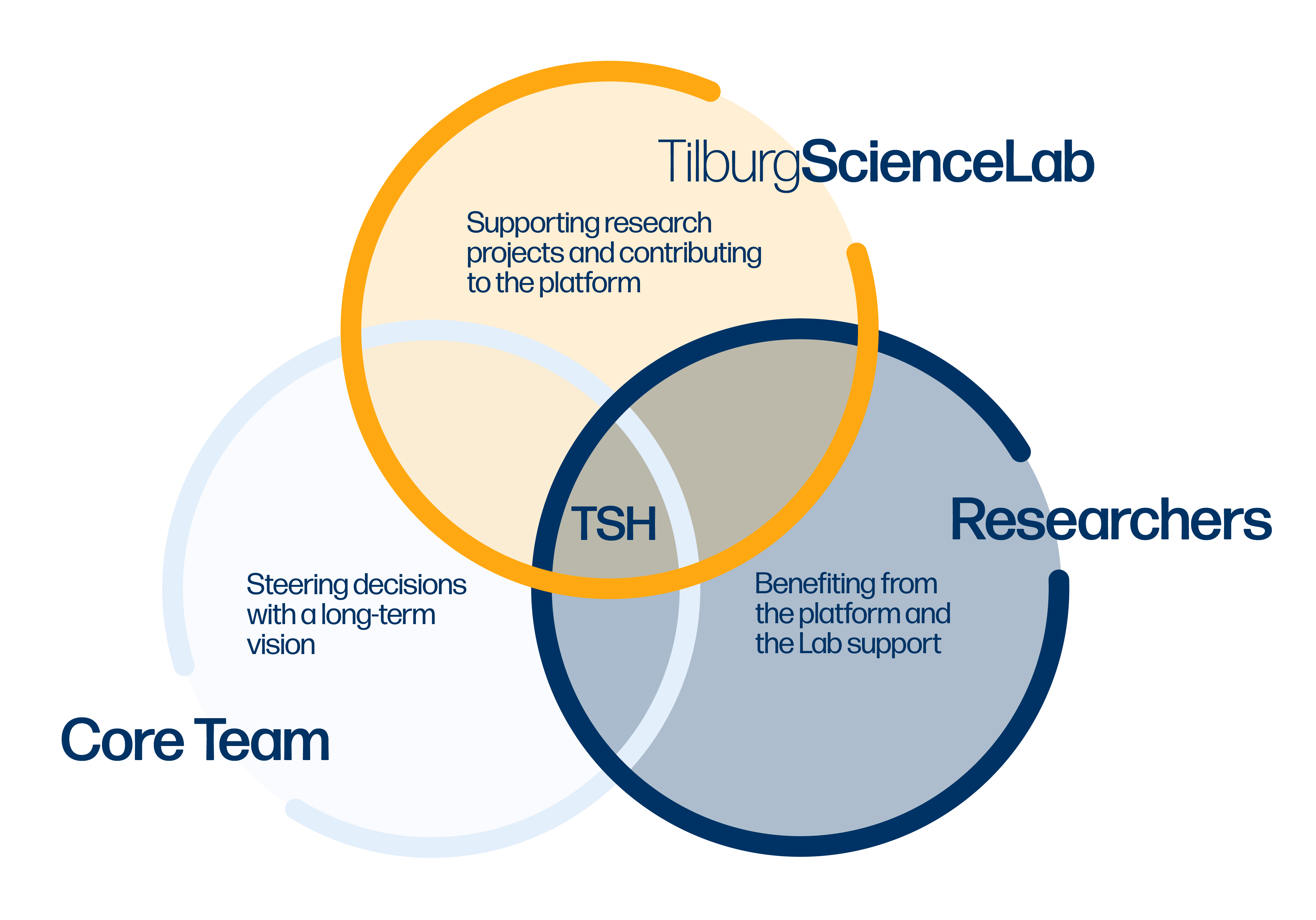About Tilburg Science Hub
Overview
Tilburg Science Hub (TSH) helps individual researchers, data scientists and their teams to efficiently work on empirical research projects. Our platform provides information about workflow and data management and tutorials that teach researchers how to organize and document their data and code. That way, our research becomes sustainable and reproducible, leading to time savings and transparency.
Why was Tilburg Science Hub developed?
Professional tools are tremendously helpful to carry out empirical research. Think about how much time you could save when automating your projects or debugging your projects faster! Yet, many of us face a dilemma: We know that a small investment in new skills will have big returns, but we put off making it because we lack the time to make it now. Tilburg Science Hub helps you getting started quickly.
What does Tilburg Science Hub offer?
To increase your productivity when working on empirical research projects, we provide:
- information on state-of-the-art tooling, all in one place,
- tutorials that get you started on larger projects,
- code snippets to use in your work ("building blocks"), and
- many inspiring use-cases and examples.
Our content makes it much more attractive and fun to start now, because youe initial time investment becomes smaller.
Curious to learn more? Then take a tour of Tilburg Science Hub now!
Who is Tilburg Science Hub for?
Are you a research master or PhD student? Use Tilburg Science Hub to quickly become operational and learn not only about how to properly code a specific algorithm but also how to address specific marketing-related problems.
Academic scholars, in turn, will be able to (1) reproduce published work in a more efficient way and (2) identify code snippets that might be useful, and (3) potentially become contributors at little cost.
Companies and data science enthusiasts can get efficient training into state-of-the-art tooling, and access to code to their own situation.
Who maintains Tilburg Science Hub?

Tilburg Science Hub is an open-source project. Its development has been financially supported by Tilburg School of Economics and Management (2019-...).
The project consists of:
- A Core Team who manages the platform. Currently, the platform is managed by Hannes Datta, Tobias Klein, Lachlan Deer and Shrabastee Banerjee.
- A Lab of Research Assistants, Teaching Assistants, and Ph.D. students who further develop the platform and support researchers with their empirical projects.
- A group of Researchers who can benefit from the support of the Lab and implement our new way of working in their research projects.
Some material is based on the fantastic (open source) works of others - see below.
Want to contribute to this open-source initiative - as a researcher, student, research assistant or volunteer? Visit our GitHub repository to see how. Or read the Tilburg Science Lab Onboarding Guide to become part of Lab.
Any questions?
Feel free to reach out to us at tsh@tilburguniversity.edu.
Acknowledgements
We are grateful to the following "sister" initiatives from which we have borrowed some of our content.
Software setup
Installation Guide, Programming Practices for Research in Economics
University of Zurich, by Ulrich Bergmann, Lachlan Deer, Adrian Etter, Julian Langer, Ursina Schaede, Dora Simon, Max Winkler, Carlo Zanella & Christian Zünd.
Programming Practices For Economists
By Lachlan Deer, Adrian Etter, Julian Langer & Max Winkler.
Effective Programming Practices for Economists
A course by Hans-Martin von Gaudecker.
Managing Software Research Projects
A lesson by Software Carpentry.
Best Practices for Scientific Computing.
Wilson G, Aruliah DA, Brown CT, Chue Hong NP, Davis M, Guy RT, et al. (2014) PLoS Biol 12(1): e1001745.
Project Setup and Workflow Management
Code and data for the social sciences: A practitioner’s guide
Gentzkow, M., & Shapiro, J.M. (2014). Chicago, IL: University of Chicago.
Workshop material developed at Tilburg School of Economics and Management on managing data- and computation-intensive research projects.
By Hannes Datta.
License
Text and content are licensed under a Creative Commons Attribution-NonCommercial-ShareAlike 4.0 International License.




